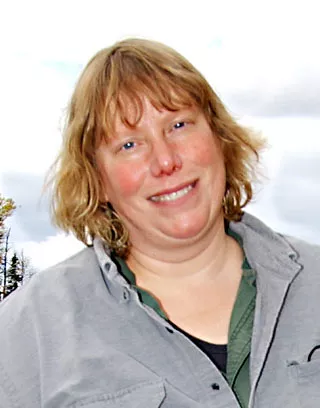
Booth, Dr. Annie
PhD, MES, BA
Biography
I hold a PhD in Land Resources from the University of Wisconsin-Madison (1992), where I studied environmental ethics, Native American Studies, eco-feminism and bio-regionalism, among other things. I also have a Masters in Environmental Studies from York University in Ontario (1985), where I studied ecological policy reservation and societal attitudes. Just to be different, I also have Bachelor of Arts from the University of Victoria in British Columbia (1981) where I studied History. With Dr. Zoe Meletis I co-founded and am the co-organizer of the annual Inspiring Women Among Us event, a week-long series of activities and events at UNBC in Prince George that recognizes the many contributions made by women in society. I am also the faculty advisor for the BA Environmental and Sustainability Studies, the BA Joint Major in English and Environmental and Sustainability Studies and the BA Joint Major in Environmental and Sustainability Studies and Political Science. I am the Chair of the Environmental and Sustainability Studies Curriculum Committee and I have overseen the BA since 1993. Over the years, I’ve developed and taught a lot of different graduate and undergraduate courses. Currently I teach ENVS 326 - Natural Resources, Environmental Issues and Public Engagement, ENVS 414/NREM 411 - Environmental and Professional Ethics, and ENVS 480 - Introduction to Environmental Citizenship.
Research and Expertise
I have a lot of research interests, Environmental and Sustainability Studies is a great field. I study environmental and natural resources policy and planning; environmental ethics; Indigenous resource management strategies and philosophies; planning; women and environments; community based resource management; public engagement and consultation strategies; and social perspectives on non-human animals. My publications represent these areas.
- Animal Welfare
- Climate Change
- Environment
- Ethics
- First Nations
- Gender and Women's Studies
- Natural Resources
- Northern Issues
- Sustainability
- Wildlife
- English
Selected Publications
Booth, A.L., K. Aben, B. Otter, T. Corrigall, C. Ray, and S. Earley. 2020. Carbon Management and Community-Based Action Learning: A Theory to Work Experience. Action Learning: Research and Practice. DOI: 10.1080/14767333.2020.1712845
Booth, A.L. 2019. Hungry Ghosts: The Impact of Food as a Workplace Health Concern Among University Staff and Faculty. Human Ecology Review 25(2): 69-88.
Booth, A.L. and D.A.J. Ryan. 2019. A Tale of Two Cities, With Bears: Understanding Attitudes Towards Urban Bears in British Columbia, Canada. Urban Ecosystems 22(5): 961-973.
Rajan, J., A.L. Fredeen, A.L. Booth, and M. Watson. 2018. Measuring Food Waste and Creating Diversion Opportunity at Canada’s Green UniversityTM. Journal of Hunger and Environmental Nutrition 13(4): 573-586.
Booth, A.L. 2017. Northern Environmental Justice: A Case Study of Place, Indigenous Peoples and Industrial Development in Northern British Columbia, Canada. Invited submission to Case Studies in the Environment. Volume 1: DOI: https://doi.org/10.1525/cse.2017.sc.454154.
Booth, A.L. 2017. Dog Eat Dog World: Public Consultation and Planning on Contested Landscapes, A Case Study of Dog Parks and Municipal Government. Community Development Journal 52(2): 337-353.
Rajan, J. and A.L. Booth. 2016. Sustainability and Waste Management of the 2015 Prince George Canada Winter Games. International Journal of Sustainable Development and Planning 11(3): 255-262.
Booth, A.L. and D.A.J. Ryan. 2016. Goldilocks Revisited: Perceptions of Urban Bears and their Management in Prince George, British Columbia. Human Dimensions of Wildlife 21(5): 460-470.
Booth, A.L. and B.R. Muir. 2013. ‘How Far Do You Have to Walk to Find Peace Again?’: A Case Study of First Nations’ Operational Values for a Community Forest in Northeast British Columbia, Canada. Natural Resources Forum, a United Nations Sustainable Development Journal 37(3): 153-166.
Muir, B.R. and A.L. Booth. 2012. Losing its Way: Environmental Impact Assessment in British Columbia, Canada. Environmental Justice 5(3): 164-167.